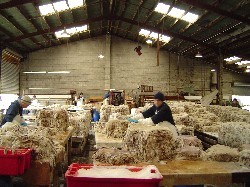Nichols NZ Fur Trade
Nichols (NZ) Ltd is a "supplier of quality tanned skins of New Zealand and Australian origin." It is based at 29 Wickham Street, Bromley, Christchurch, New Zealand and is a subsidiary of UK based L H Nichols Ltd.
Nichols slaughters Australian native possums for commercial profit.

Nichols (NZ) Ltd is a "supplier of quality tanned skins of New Zealand and Australian origin". It is based at 29 Wickham Street, Bromley, Christchurch, New Zealand and is a subsidiary of UK based L H Nichols Ltd.
The Nichols Group has operated since the 1950's and now includes tanneries in both the United Kingdom and Christchurch, New Zealand and also operates in Victoria, Australia.
Nichols has a well established customer base in Australasia, The Americas, Europe and Asia, offering manufacturers high quality finished leathers, and other tanners, carefully selected and graded raw material.
Nichols slaughters Australian native possums for commercial profit.
Nichols argues it is doing New Zealand a favour in the process.
How is it killing them?
Meanhile, back in their native home Australia, possums are respected as an important native animal by the volunteer Wildlife Informaton Rescue and Education Service Ince. [WIRES]
The NSW Wildlife Information,Rescue and Education Service Incorporated WIRES is the largest wildlife rescue organisation in Australia. When an echidna is hit by a car, a possum is attacked by a cat or a lizard gets its head stuck in a drink can - WIRES is there to help.
Since 1985, WIRES has established a network of hundreds of volunteers who rescue, rehabilitate and release sick, injured or orphaned native animals. Each year WIRES receives over 100,000 phone calls and rescue over 56,000 native animals, from injured bluetongues to orphaned wombats.
WIRES is a non-profit, non-political charity with branches operating across NSW. Over 90 per cent of our funding comes from public donations. Each year we receive a small grant from the NSW National Parks and Wildlife Service and the NSW Department of Agriculture these grants represent less than 2.5per cent of our funding.
At WIRES, the best interests of the animal are always placed first. After treatment - often involving intensive veterinary care and nursing by unpaid rescuers and carers - animals are returned to the wild, with as little human intervention as possible.
See also: candobetter.net/Wildliferescue - Ed, 6 Apr15


Recent comments